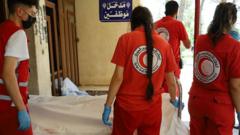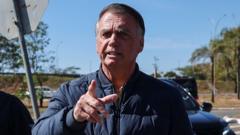Are Summary Executions Occurring in Syria's Ongoing Conflict?

Understanding the Recent Violence in Suweida: A Human Rights Perspective
The ongoing violence in the southern city of Suweida has captured international attention as reports emerge detailing widespread human rights violations. The UN human rights chief, Volker Türk, has articulated grave concerns regarding these events, indicating that credible reports have surfaced of summary executions, arbitrary killings, and severe abuses. This article aims to explore the dynamics of the violence in Suweida, the involved parties, and the pressing need for accountability and justice.
The Context of Violence in Suweida
Suweida is a predominantly Druze city in southern Syria, a region that has witnessed significant turmoil since the outbreak of the civil war in 2011. The current violence erupted amid sectarian clashes between Druze militias and Bedouin tribes, escalating to a level that has resulted in nearly 600 fatalities since the onset of these conflicts. This figure reflects not only the human cost but also the deep divisions within the society, underscored by historical grievances and current geopolitical tensions.
The Role of the Interim Government
In response to the violence, the interim government led by President Ahmed al-Sharaa has deployed security forces to Suweida for the first time since the civil war's onset. This marked a significant shift in approach, as the government had previously distanced itself from direct involvement in the region. However, the deployment has raised alarms among local residents who fear that state security forces could exacerbate the violence rather than quell it.
Escalation of Violence
Reports indicate that the fighting intensified, with government forces accused of committing atrocities against Druze civilians. Allegations of extrajudicial killings have sparked outrage and fear within the community. For instance, on July 15, the UN human rights office documented the unlawful killing of at least 13 people, including six who were reportedly executed by armed individuals linked to the interim government.
The Human Rights Violations
The violations reported in Suweida are alarming and multifaceted. Key issues include:
- Summary Executions: Numerous accounts detail summary executions, including horrifying incidents where individuals were killed without due process.
- Arbitrary Killings: The UN has highlighted instances where government forces targeted civilians, raising questions about the rule of law in the region.
- Cultural Humiliation: Reports of public humiliation, such as the forcible shaving of a Druze man's moustache—a significant cultural symbol—underscore the psychological and cultural impact of the violence.
Impact on Civilians
The humanitarian impact of the violence cannot be overstated. Civilians, already traumatized by years of conflict, now face new threats to their safety and dignity. Many are living in fear for their lives and the lives of their loved ones. The fear of state security forces, rather than providing protection, has compounded the sense of vulnerability among the Druze community.
The Call for Accountability
Volker Türk has emphasized the necessity for accountability in his statements regarding the violence in Suweida. He has called for independent, prompt, and transparent investigations into all reported violations. The principle that those responsible must be held accountable is crucial not only for justice but also for restoring faith in the rule of law.
Responsibility of the Syrian Government
In a televised address, President al-Sharaa insisted that the protection of the Druze community is a priority. He vowed to hold accountable those who have committed abuses, framing the violence as the result of "outlaw groups." However, this narrative raises questions about the government's commitment to genuinely addressing the root causes of the conflict and ensuring justice for victims.
The Role of International Bodies
International bodies, including the UN, have a crucial role to play in monitoring the situation in Suweida and advocating for human rights. The call for independent investigations aligns with international human rights standards and reflects a broader commitment to addressing impunity in conflict situations.
The Fragile Truce and Future Prospects
As of recent reports, a fragile truce has emerged in Suweida, prompting hopes for de-escalation. The Syrian government has announced plans to withdraw military forces, transferring security responsibilities to local religious leaders and community factions. While this development may provide a temporary reprieve, the underlying tensions remain unresolved.
Local Dynamics and the Complexity of Alliances
The intricate web of alliances and enmities among local factions complicates the situation in Suweida. The Druze and Bedouin communities have historical grievances that exacerbate the current conflict. Additionally, external influences, including regional powers and their interests, further complicate the dynamics at play.
Regional Implications: The Role of External Actors
The violence in Suweida is not an isolated incident but rather part of a larger regional struggle. The involvement of external actors, such as Israel, which has conducted airstrikes in the area, adds another layer of complexity. Israel's stated objective of protecting Druze communities from government forces highlights the interconnectedness of regional politics and local violence.
The Broader Context of the Syrian Civil War
The current violence reflects broader trends within the Syrian civil war, characterized by shifting alliances, sectarian strife, and the struggle for power among various factions. The ongoing conflict continues to displace countless individuals, undermine social cohesion, and impede any prospects for a sustainable peace process.
Conclusion: The Path Forward
The situation in Suweida serves as a stark reminder of the fragility of peace and the urgent need for accountability in the face of human rights violations. As the international community watches closely, it is essential to prioritize the voices of the affected communities and ensure that their rights are upheld. The call for independent investigations and accountability is not merely a legal obligation; it is a moral imperative that must guide future actions.
As the world reflects on the events in Suweida, one must ponder: How can we ensure that justice prevails and prevent further cycles of violence in conflict zones? The answer lies in a collective commitment to uphold human rights and foster dialogue among all parties involved.
FAQs
What are the main human rights violations reported in Suweida?
The main violations include summary executions, arbitrary killings, and public humiliation of individuals, particularly targeting the Druze community.
What is the role of the Syrian government in the violence?
The Syrian government, led by interim President Ahmed al-Sharaa, has deployed security forces to the region, but their actions have been criticized as exacerbating violence against civilians.
Why is accountability important in this context?
Accountability is crucial to restore trust in the rule of law, ensure justice for victims, and prevent future violations. It is a fundamental aspect of any peace process.
As we navigate these complex issues, the need for dialogue and understanding remains critical. How can we work together to promote peace and protect human rights in conflict zones? #Suweida #HumanRights #Syria
Published: 2025-07-18 11:21:05 | Category: technology



